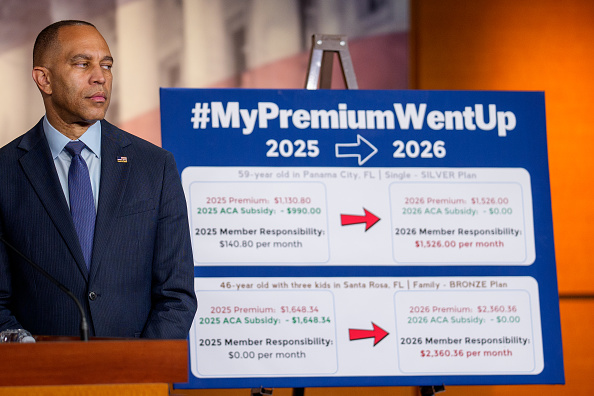The continuing growth in states’ Medicaid programs has placed a severe financial strain on state budgets. In fiscal year 2024, Medicaid was the largest category of total state spending, consuming 29.8 percent of the average state budget, the National Association of State Budget Officers reports. “Medicaid comprised over half (56%) of all federal funds to states in 2024,” the report notes, putting pressure on the federal government to reduce its share of Medicaid spending, which it did in the One Big Beautiful Bill Act of 2025.
In addition to being on the road to bankruptcy, Medicaid provides low-quality coverage. The gold-standard Oregon Experiment in 2013 conclusively showed Medicaid does not improve recipients’ health. Free-market solutions, by contrast, have consistently been proven to lower health care costs while increasing competition and consumer choice.
Fortunately, policymakers can reform Kansas’ Medicaid program through a federal waiver. President Donald Trump has strongly promoted state Medicaid waivers, though progress in his first term was stymied by the COVID-19 pandemic and lawsuits over work requirements, which were codified by Congress this year in the One Big Beautiful Bill Act. State policymakers should take advantage of the current administration’s openness to innovation because fundamental federal reforms are unlikely for the foreseeable future.
Waivers can allow states to make significant alterations to their Medicaid programs. In 2020, just before the pandemic, the Trump administration offered a plan to allow states to apply for block grants and receive a fixed, or capped, federal payment for all able-bodied adults in the program—and be exempted from some Medicaid requirements. Rhode Island had success with a block grant program in 2009 that allowed it to cut waste and streamline services, which made the program more efficient and sustainable.
With waivers, states could expand the use of health savings accounts (HSAs) for the Medicaid population. Economist John C. Goodman says Medicaid waivers would discourage Medicaid enrollees from using expensive emergency rooms for primary care.
Waivers could allow enrollees to use their cash accounts to pay for membership in direct primary care practices and pay-as-you-go clinics. HSAs could also allow better use of lower-cost surgical options like the fixed-price surgical center Christian Healthcare Centers which opened in 2022.
States might also seek waivers to impose lockout periods for Medicaid enrollees who fail to show up for appointments or pay a small share of costs. States could also impose time or cost limits for enrollment in Medicaid.
Other reforms states could implement under waivers include “skin in the game” cost sharing, benefit flexibility, payment and eligibility changes, telehealth access, wellness incentives, charity waivers, transportation coverage, and similar innovations.
States can also submit proposals to HHS to reform their Obamacare markets via 1332 waivers. This could include expanding the use of cost-sharing mechanisms, such as co-pays, premiums, or health savings accounts; and redefining which services are considered “essential health benefits”—benefits all plans must cover under the Affordable Care Act (ACA).
Directing Medicaid to populations most in need would also give states more freedom and resources to address escalating demand for mental health services. The KFF research group reports Medicaid covers nearly one in three of the 52 million nonelderly adults who currently live with mental illness. Given recent headlines, Medicaid appears to be inadequately addressing access to mental health treatment.
States know their residents best and are smaller and better able to design innovative solutions than the federal government. Healthy people do not need all the coverage Medicaid provides. People place little value on Medicaid: only 20 to 50 cents on the dollar. Last year, when Georgia required Medicaid enrollees to work for benefits, only 4,300 people signed up. People can get Medicaid retroactively (30 days in 2027) if they qualify and are caught without care. The uninsured with higher incomes who need care can jump on an Obamacare plan in November.
To get a Section 1115 waiver approved, a state must prove to the secretary of the Department of Health and Human Services (HHS) that its proposal meets the goals of the Medicaid program and federal budget requirements. Section 1115 waivers generally are approved for a five-year period and then must be renewed.
Although the Centers for Medicare and Medicaid Services (CMS) is ending waivers for continuous enrollment and workforce training (issues now covered by provisions in the One Big Beautiful Bill Act), CMS is encouraging other types of waivers. “Going forward, CMS is focused on supporting actions that demonstrate clear health benefits, cost savings, and strong accountability for federal spending,” the agency stated in a July 17 news release.
Kansas lawmakers would benefit Medicaid recipients by slowing the program’s movement toward insolvency as skyrocketing costs threaten to devour all discretionary spending in the state.
The following documents provide useful information about potential Medicaid reforms and the waiver process.
Medicaid Section 1115 Waivers: The Basics
The KFF research group explains how states can use Section 1115 Medicaid waivers to implement innovations outside of the standard program outlined in federal law, provided they fulfill the program’s objectives, do not cost the federal government more money, and meet other criteria.
The federal Medicaid website lists the status of all current, concluded, or pending Section 1115 state waiver programs and proposals.
Healthcare Toolkit: Ten Reforms State Lawmakers Can Implement Now
The State Policy Network identified multiple reforms states could achieve through Medicaid waivers in 2017, nearly all of which are still needed in the wake of the limited reforms in the One Big Beautiful Bill Act of 2025.
American Health Care Plan: State Solutions
Researchers from The Heartland Institute explain what states can do to make health care more accessible and affordable while awaiting a comprehensive federal plan to replace the current outdated, wasteful, access-denying, government-warped health care system.
No Better Time Than Now for Real Medicaid Reform
In an interview with Health Care News, Gary Alexander of the Paragon Health Institute discusses possible Medicaid reforms and political obstacles state legislators might face in promoting them. Alexander explains how Pennsylvania’s Enterprise-wide Program Integrity Initiative saved the state $2 billion.
The Oregon Experiment—Effects of Medicaid on Clinical Outcomes
This article from The New England Journal of Medicine examines Medicaid outcomes in Oregon. Researchers studied the effects of being enrolled in Medicaid (compared to being uninsured) based on data from a randomized controlled trial, the “gold standard” of scientific research. The results showed no improvement in health for enrollees, just increased medical spending and better financial outcomes for patients than being uninsured.
This fact sheet from healthinsurance.org explains how states can reform their ACA insurance systems through 1332 waivers to create “unique, state-specific solutions—which can include fairly substantial changes in terms of how the Affordable Care Act is implemented in the state—as long as consumer protections are maintained, people don’t lose coverage, and the federal government doesn’t have to spend any more than they would have without the state’s innovation.”
Nothing in this Research & Commentary is intended to influence the passage of legislation, and it does not necessarily represent the views of The Heartland Institute. For further information on this and other topics, visit the Health Care News website and The Heartland Institute’s website.
The Heartland Institute can send an expert to your state to testify or brief your caucus, host an event in your state, or send you further information on a topic. Please don’t hesitate to contact us if we can be of assistance! If you have any questions or comments, contact Heartland’s government relations team at [email protected] or 312/377-4000.
S. T. Karnick
S. T. Karnick is a Senior Fellow at The Heartland Institute.




